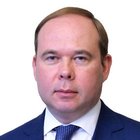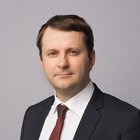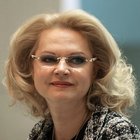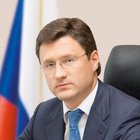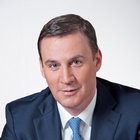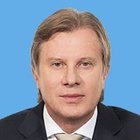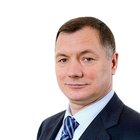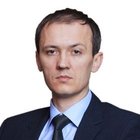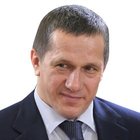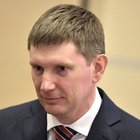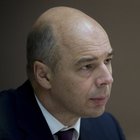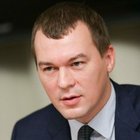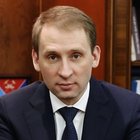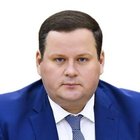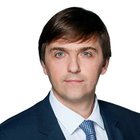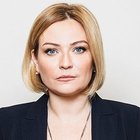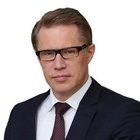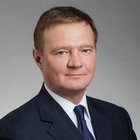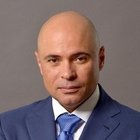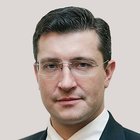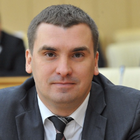The meeting was attended by Chief of Staff of the Presidential Executive Office Anton Vaino, First Deputy Prime Minister Denis Manturov, Deputy Chief of Staff of the Presidential Executive Office Maxim Oreshkin, deputy prime ministers Tatyana Golikova, Alexander Novak, Dmitry Patrushev, Vitaly Savelyev, Marat Khusnullin, Deputy Prime Minister – Chief of the Government Staff Dmitry Grigorenko, Deputy Prime Minister – Plenipotentiary Presidential Envoy to the Far Eastern Federal District Yury Trutnev, Minister of Economic Development Maxim Reshetnikov, and Finance Minister Anton Siluanov.
Minister of Sport Mikhail Degtyarev, Minister of Natural Resources and Environment Alexander Kozlov, Minister of Labour and Social Protection Anton Kotyakov, Minister of Education Sergei Kravtsov, Minister of Agriculture Oksana Lut, Minister of Culture Olga Lyubimova, Minister of Healthcare Mikhail Murashko, Minister of Transport Roman Starovoit, State Secretary – Deputy Defence Minister Nikolai Pankov, Lipetsk Region Governor Igor Artamonov, Nizhny Novgorod Region Governor Gleb Nikitin, and Head of the Russian Popular Front Executive Committee Mikhail Kuznetsov were also invited to attend the meeting.
* * *
Excerpts from the transcript of the meeting with Government members
President of Russia Vladimir Putin: Good afternoon, colleagues.
Summer has arrived, and the tourist season is pretty much in full swing, so let’s discuss auto tourism in Russia which is the main topic on today’s agenda.
But before we get down to it, we need to go over several current issues, one of which is progress of the sowing campaign. Unfortunately, we have had spells of subzero temperatures in 21 regions that killed a little over one percent – about 1.2 percent – of the crops.
Ms Lut, how do things look today?
Minister of Agriculture Oksana Lut: Mr President, colleagues.
The sowing campaign is nearing completion. As of June 4, almost 50 million hectares have been sown with spring crops, which makes up 90 percent of the planned areas.
See also
Due to complicated weather conditions, the sowing rates are slightly lagging this season. We are two to three days behind, but we are on track to finish the sowing in full by June 10.
This year, the total sowing area, including winter and spring crops, was increased by 300,000 hectares to a total of 84.5 million hectares. In a week’s time, a number of regions in southern Russia and North Caucasus plan to start harvesting the new crop.
(The Minister went on to discuss the provision of agricultural workers with resources and means of production. The demand for seeds is met in full, with priority given to domestic seeds. The regions are fully supplied with plant protection means, and the mineral fertiliser is being purchased as scheduled. Rosagroleasing programmes for subsidised purchase of agricultural machinery are operational, and there has been no information about fuel shortages or fuel supply disruptions coming from the regions).
As you noted, this is a challenging year for us with poor weather conditions registered in 21 regions. Recurring freezing temperatures hit Central Russia, the Volga region, southern regions and the Lugansk People’s Republic, and killed over a million hectares of crops which is about 1.2 percent of the total area. Notably, most of the impacted area has been reseeded.
About 700,000 more hectares have been affected, of which 600,000 are grain crops, and these areas will yield lower crops. More than 13,500 hectares of perennial fruit and berry plantations have been impacted as well. (Ms Lut also said that the amount of insurance payments currently stands at 600 million rubles).
Now, I will briefly outline preliminary output forecasts.
Despite the challenges, we keep unchanged our expectations for the grain harvest at the level of 132 million tonnes and oilseeds at the level of 28 million tonnes which will be sufficient to fully meet the needs of the domestic market and to maintain a significant export potential in terms of raw materials and processed products alike. On a separate note, we expect grain exports to hit 60 million tonnes this season.
We plan to produce 45.5 million tonnes of sugar beet. Also, we will produce 7.3 million tonnes of potatoes and 7.4 million tonnes of vegetables in the formal sector. That is, we are going to plant, and the weather had no effect on us.
With carryover in place, we will fully meet the needs of our livestock breeders in fodder crops, which will give another boost to the industry.
The above numbers in the main areas of crop production will help us maintain a stable situation along the entire chain of production and preclude sharp price fluctuations on the market. The country’s food security will certainly be ensured.
That concludes my report. Thank you.
Vladimir Putin: Ms Lut, I hope you will be able to take the necessary decisions to support agricultural producers and ensure timely import of the products we need. Please do not delay or procrastinate on any of these measures to avoid price hikes on the domestic market.
By the way, you have not answered my question about apples. To what extent do domestically grown apples meet our domestic demand? What is their share compared to overall consumption?
Oksana Lut: Mr President, currently domestic fruit production covers about 44 percent. According to the Food Security Doctrine, we need to reach a threshold of 60 percent by 2030.
Vladimir Putin: That is to say that this is still work in progress, right?
Oksana Lut: Yes, that is correct.
Vladimir Putin: This means we must create a favourable environment for that. You should work with the Government’s economic bloc, including the Finance Ministry. We must put the necessary conditions in place so that this sector attracts more investment.
Oksana Lut: Ok.
Vladimir Putin: After all, we have all the resources needed to achieve this. Is planting apple orchards too much of a challenge for us? Of course, they take some time to grow, but it happens quite quickly. The key is to create the economic environment. I would like you to think it over and seek advice from your colleagues. Why should we wait until 2030? I believe we can do this much faster. We will discuss this issue with Dmitry Patrushev later.
Very well. Thank you very much.
(Further on, Minister of Education Sergei Kravtsov, responding to the President’s request, reported on efforts to organise summer vacations for children, as well as on the ongoing National Final School Exam.)
<…>
Vladimir Putin: We have one more item here. I asked the Russian Popular Front to contribute to reviewing appeals and requests people sent us during the Direct Line event in 2023. You have been carrying out this mission. I would like to ask Mr Kuznetsov to report, even if briefly, on this undertaking, since we will all have to work on these matters.
After all, people turn to us to have their problems solved rather than have their appeals ignored and left to gather dust. We, including the Government, would all benefit from learning about the key issues people raise in their appeals and requests.
Please, Mr Kuznetsov.
Head of the Russian Popular Front Executive Committee Mikhail Kuznetsov: Mr President,
Since 2019, the Popular Front has been monitoring the way government agencies respond to the appeals and requests received during the Direct Line event. There were three million appeals in 2023, and these agencies responded to 520,000 of them. Regional authorities are currently reviewing another 827,000 appeals, and 690,000 have reached the stage where a specific person has been assigned to take the necessary actions, so we are waiting for them to be resolved.
This framework covers a network of 16,000 regional and federal officials, as well as state corporations. It enables them to see these appeals and requests and take them on board. Every week, all regional Popular Front offices send their staff to meet with the applicants in order to clarify their requests and help them whenever possible.
We randomly check appeals and requests marked as “resolved.” As of today, 41 percent of applicants reported that they were satisfied with the outcome they received. In this sense, we are above the levels we saw in 2021, even if we do understand that some issues require more time before they can be resolved. Nevertheless, we will keep monitoring these developments and assessing whether the people are satisfied with the responses they receive.
(Mikhail Kuznetsov went on to say that the Popular Front has been paying special attention to participants in the special military operation and their families, and also provided a detailed review of the challenges that were identified during the Direct Line. These included the provision of medicines to welfare beneficiaries, as well as the delivery of rehabilitation equipment to people with disabilities. He also mentioned how appeals related to vocational training and promoting a healthy lifestyle through sports are being handled.)
Mr President, we are also monitoring the repairs and renovations of social facilities mentioned in the appeals we received during the Direct Line. These complaints deal with failures to comply with deadlines for completing these projects. I can offer several examples without naming specific regions.
One of the regions started renovating a Palace of Culture after a complaint about it was received during your 2016 Direct Line event. As of today, only half of the works included in this project have been completed. People continued sending their complaints to the Direct Line in 2021 and 2023.
One of the regions in the Central Federal District has been upgrading its regional hospital into a multipurpose medical centre since 2006. For 17 years now, people have been looking at this never-ending construction project and have even come up with a nickname for it, calling it the Titanic.
Another region, this time in the Urals, has been experiencing delays in a project to build a central regional hospital. It has been ongoing since 2010, and the deadline has been extended several times. The hospital is 99 percent ready, according to official reports. However, according to our office in this region, this is not true, while people are left in the dark and do not know when the construction will be completed.
Mr President, thank you very much for the opportunity to deliver this interim report on addressing the requests we received during your Direct Line. We will carry on with our efforts.
Vladimir Putin: This is all very important. I ask you to make sure that you complete this effort so that you can then work with the Presidential Executive Office and the Government on all these issues. This requires a lot of hard but useful effort, and this matters a lot, since this is the feedback we keep talking about.
(Healthcare Minister Mikhail Murashko and Minister of Sport Mikhail Degtyarev followed up on this topic at the President’s request.)
Vladimir Putin: Of course, exercise and sports have a major role to play when it comes to living healthy lives and the health of our nation in general.
On the question of what prevents people from doing sport, unfortunately, there are still quite a few obstacles. I believe that the key to this issue lies in the fact that physical fitness and mass sport are becoming increasingly business ventures. What we see is a push to make Russian families pay for participating in sports. This is something we must pay attention to, including in terms of how the law governing sports operates. We must understand that people with modest incomes, I mean families with small incomes, cannot afford to keep paying for their children’s sports activities all the time, while we cannot ignore what is happening. We must seek to ensure that as many people as possible have the opportunity to exercise and do sport. But for that we need to create a favourable environment. It goes without saying that the state must be there to allocate the funding we need for delivering on this objective.
Apart from that, the sky is the limit. We need to have a positive attitude and support all sports organisations. However, creating favourable conditions to enable people to pay as little as possible for exercising and participating in sports is an absolute priority for us. I ask you to focus on this issue. We will return to it later.
Let us move on to the key issue on our agenda, promoting auto tourism.
Mr Reshetnikov, go ahead, please.
Minister of Economic Development Maxim Reshetnikov: Mr President, colleagues,
The demand for domestic travel continues to grow. Last year, Russians as well as foreign visitors made 83 million trips, which is 20 percent more than the pre-COVID figure. This year, we expect more than 90 million trips.
Tourist infrastructure, including hotels, resorts, beaches and amusement parks is growing fast in Russia. We provide state support to businesses and regions under the Tourism and Hospitality Industry national project. We regularly report to you on the results. We greatly appreciate your support, which enables us to expand the project further.
The summer tourist season has begun, which is the best time for auto tourism. This type of tourism accounts for an increasing share of travel around the country. According to surveys, over the past five years, 40 percent of Russians have travelled somewhere by car. Last year, according to statistics, tourists made 26 million tourist trips by car, and we expect this figure to double by 2030.
This is the goal of the Concept for the Development of Auto Tourism, which was designed in response to your instructions and approved by the Government. The core notion of this concept is an “auto route,” which refers to an integrated project with roads, roadside services, cafes, restaurants, recreation areas with campsites, glamping sites, hotels, observation decks, and museums with convenient opening hours for an auto tourist, and national parks offering amenities for vacationing with children, mobile connectivity, internet access and other facilities an auto tourist might need.
(The Minister reported that the suggestion is to implement the concept in three time horizons and gave a detailed overview of the measures to be taken during each one of them. At the first stage, the routes most frequently used by tourists have been identified. Those include about a third of the federal roads that lead to large cities and key tourist attractions. A list of auto tourist routes is to be formed and posted on the Путешествуем.рф national tourist website. Plans are in place to bring those roads up to standard where this is not yet the case, and further develop local tourism infrastructure, including facilities for eco-tourism. Among the longer-term objectives, Maxim Reshetnikov mentioned the creation of multifunctional motorway service areas on auto tourist routes (at present, there are 440 such areas around the country, and about as many are to be built) and addressing the shortage of tourist buses by procuring 3,000 new buses every year. It is proposed to work together with the Ministry of Transport to develop a programme to promote domestic bus manufacturing.)
Mr President, these comprehensive policies should result in creating affordable, safe and convenient auto routes, enabling more tourists of all ages, families with children and foreign guests choose this type of travel.
I ask for your support. A draft of your instructions has been prepared, which will allow us to expedite the implementation of the initiatives I mentioned.
Thank you.
(The report was followed by a discussion that involved, at the President’s request, First Deputy Prime Minister Denis Manturov, Governor of the Nizhny Novgorod Region Gleb Nikitin, Head of the Russian Popular Front Executive Committee Mikhail Kuznetsov, Finance Minister Anton Siluanov and Deputy Prime Minister Marat Khusnullin.)
<…>
Vladimir Putin: I would like to thank everyone who prepared today’s meeting. This is an important aspect of our joint efforts, and the more tourists use these services, the better. We are doing all this for the people, but the economy benefits too, since the money stays in our country. That is why I ask you to draft the final version of the instructions concerning this matter.
This also concerns manufacturing – I am primarily referring to cars, buses, etc – there is still room for improvement. We must improve and fine-tune regulations and so on and so forth. It is essential that we do not delay on these matters. Therefore, I ask you to complete this work as quickly as possible.
At this point, we can consider this part of the meeting and the meeting in general closed. That said, I still have one more question which is not related to developing tourism. I am referring to the recent meeting on developing the defence industry. It took place in Korolev and some of our colleagues here took part in it.
We agreed to draft instructions as a follow-up to that meeting too. I know that our colleagues have been working hard over the past few days to do this. I ask you to finish this job. We must achieve our priorities in defence manufacturing. This is a matter of producing the most needed military products at the required scale and, of course, making sure their production is economically sustainable.
I ask Mr Manturov as First Deputy Prime Minister, Minister of Industry and Trade [Anton Alikhanov], Defence Minister [Andrei Belousov], Finance Minister [Anton Siluanov], and the Presidential Executive Office to complete this work as quickly as possible. I want it to be ready by tomorrow. My colleagues and I have already discussed this matter in our conversations today, and I think that we said everything there was to say about it. We must complete this effort without delay.
Considering the multifaceted nature of these matters, profitability is also a major factor here. We must also ensure that the Defence Ministry gets the vehicles and equipment it needs.
For that, we need an independent coordinator. Security Council Secretary [Sergei Shoigu] will take on this task. Please keep this in mind. Let me reiterate that I am asking you to complete this by tomorrow.
Once again, I would like to thank everyone who worked on our today’s topic. Please make sure to draft the corresponding instructions as quickly as possible.
Thank you very much and all the best to all of you.



